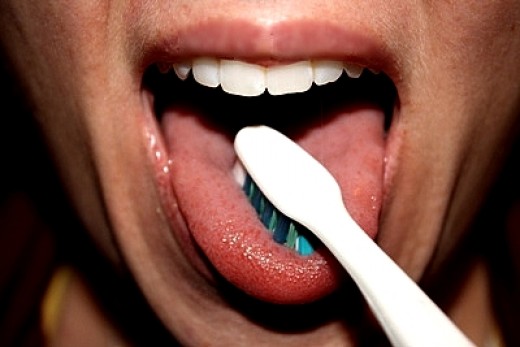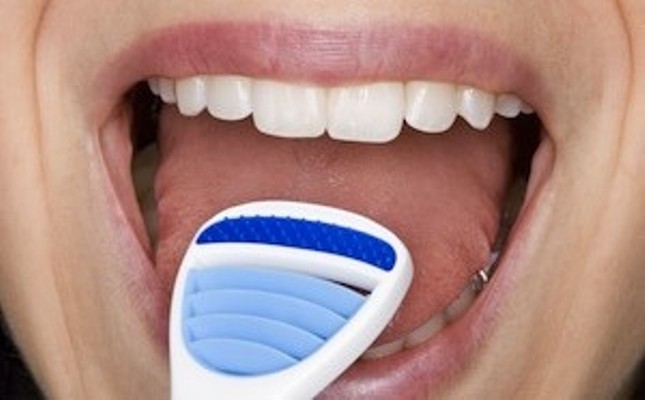Although you may brush and floss your teeth twice a day, you are not addressing all of the sources of bacteria in your mouth if you ignore your tongue. The tongue has bumps and crevices where bacteria can hide, which can lead to bad breath and other oral issues. The bacteria that accumulate on your tongue can be eliminated if you know the correct ways to clean your tongue.
How to Clean Your Tongue
If you want to cure your bad breath, you should consider brushing or scraping your tongue on a regular basis. In many cases, cleaning your tongue may be the only solution you need to help get rid of bad breath.
Brushing
 You don’t need a special tool to brush your tongue, an ordinary toothbrush will suffice.
You don’t need a special tool to brush your tongue, an ordinary toothbrush will suffice.
- Just dip the brush in water to soften the bristles and stick your tongue out as far as you can. You should be able to see a coating on your tongue or you may be able to feel it or taste it.
- Start at the back of your tongue and brush across it to break up and remove the coating as you move the brush forward.
- Apply a gentle pressure as you brush so the coating will be broken up, but not so hard that you tongue becomes irritated.
- Rinse your mouth out and examine your tongue by sticking it out again. If you need to, brush you tongue some more and rinse it again.
- When you are finished, rinse your brush out and let it air dry. While you don’t necessarily need to use it, you can brush your tongue with toothpaste or dip the brush in mouthwash before brushing.
Scraping
There are two different types of tools you can use when learning how to clean your tongue.
- Scraper: You can use something as simple as an inverted spoon to scrape your tongue or you can buy a tongue scraper.
- Tongue cleaner: A tongue cleaner is similar to both a scraper and brush as it has rubber nubs you can use to break up the coatings on the surface of your tongue. It also has a blade-like part to scrape your tongue.
 Instructions
Instructions
- Moisten a teaspoon or a tongue scraper with water and stick your tongue out as far as possible to locate the coating.
- Turn the teaspoon upside down and, with a firm but gentle pressure, move it forward over your tongue. If you are using a scraper, move the blade over your tongue with enough pressure to clean it, but not irritate it.
- Rinse the implement with water and examine your tongue to see how well it was cleaned. If you need to, scrape it several times and rinse your mouth out when you are finished.
Additional Tips
- Clean the tongue's coating: When you're learning how to clean your tongue, you should direct most of your efforts toward the back of the tongue because that is where most of the coating is located. However, do not reach too far back and clean the tonsillar tissues, you only have to clean the smooth part of the tongue.
- Apply gentle pressure: Whether you brush or scrape your tongue, you should only use a firm, but gentle pressure because you can easily irritate your tongue to the point of bleeding if you use too much force. Focus on cleaning the middle portion of the tongue instead of the sides to avoid irritation.
- Morning routine: Clean your tongue as part of your morning routine after getting out of bed. The morning is a good time to clean it as that is when it is most likely to be coated. In addition, your stomach will be empty, so if you gag, you will be less likely to throw up.
How Often Should You Clean Your Tongue?
After learning how to clean your tongue, you should do so every morning and evening after brushing and flossing your teeth. Cleaning your tongue will help eliminate the bacteria that causes bad breath. If your mouth feels dry or there is a bad taste in your mouth during the day, clean your tongue again. Rinsing with mouthwash after each cleaning will help moisturize your mouth and help kill additional bacteria.
Why Is It Important to Clean Your Tongue?
- Better oral hygiene: The bacteria in your mouth can do more than just cause bad breath. It can also cause gum diseases like gingivitis or it can lead to tooth decay and cavities. Cleaning your tongue and eliminating bacteria can also help to prevent throat and respiratory infections.
- Improved taste: Eliminating the coating on your tongue helps restore the full function of your taste buds and helps them to be able to taste the nutrients that flavor foods. If your tongue is not clean, you will only get a general taste of the food you eat, but a clean tongue will allow you to savor your favorite foods.
- Eliminate toxins: The coating on your tongue is made of the toxins your body is trying to release while you're asleep. By learning how to clean your tongue, you can get rid of those toxins and prevent them from being reabsorbed in your body.
- Provide organ stimulation: Cleaning your tongue will act almost like acupressure and help stimulate your body's organs. Cleaning the tip stimulates your heart, while cleaning the sides helps to stimulate your liver, gall bladder and spleen.
NOTE
Cleaning your tongue can help eliminate bad breath, but if it persists, consult a dentist or healthcare provider. Bad breath can be a symptom of tooth decay, oral or nasal infections, diabetes or cancer.
